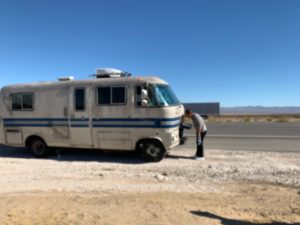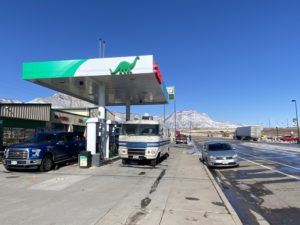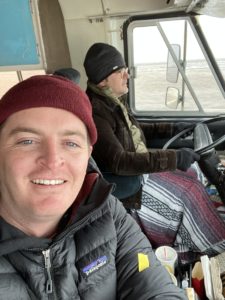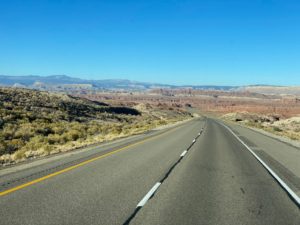“By prevailing over all obstacles and distractions, one may unfailingly arrive at his chosen goal or destination.” – Christopher Columbus
Against All Odds: Denver to LA in a Vintage RV, Part III
I woke up feeling conflicted about the luxurious meal we had at Lakeside, a top-rated restaurant in Wynn, a top-rated hotel.
The ambiance was what I had expected: plush and expensive in that over-the-top but still amazing Las Vegas/Dubai sort of way. (Did I mention that the Wynn cost $2.7 billion to build?) And the food was very good.
But it wasn’t any better than the meal we had at that diner in Green River at one-fifth the cost. It’s yet another reminder of something I’ve known for many years but keep forgetting: Paying more for luxury is seldom worth it. Spender beware.
Instead of beating myself up about it, I employed a simple but powerful trick I somehow figured out just last year in my 69th year on the planet: I forgave myself.
I had several hours before my 10:30 meeting. I looked for my laptop. It wasn’t on the desk. It wasn’t in my luggage. It was nowhere to be found. Yikes! I can’t live without it – not even for a single day. I called Lost & Found. It was closed until 9:30. I called the front desk and said that it was an emergency. They switched me to someone that said, yes, they had it.
I had left it at the bar I was sitting at after dinner. How could I have done that? Was this yet another symptom of early onset dementia? Or was it the wine and tequilas and fatigue? I don’t know. I forgave myself for the second time.
I got busy. At 10:30, we had the meeting. We were talking to our publishers, one by one, asking them how their businesses were doing. We actually know how they are doing, but we wanted to know if they are preparing for what could be a challenging year. I had asked for what I always ask for in such situations: three one-year business plans. One that is realistic, one that is optimistic, and one that is pessimistic. I’ve been doing this for 40 years. More often than not, the outcome is halfway between realistic and pessimistic. Rarely does the optimistic scenario turn out to be the reality, but it does happen. This year, it is happening with four of our 11 operating divisions. Still, I showed concern. I wanted to convey urgency. The Second Law of Thermodynamics mandates it. Even if it ain’t broken, I reminded our leaders, you should always be fixing it.
We left at noon, as planned. It was a glorious day – sunny and 70 degrees. Betty the Beast (an appellation I had given the Dodge) moved out on the highway proud and strong. Michael’s tape of 70s music was pumping. It looked like we would be in LA at 4:30 or 5:00. If all went well.
Forty minutes into this last stage of our adventure, Liam announced that the heat gauge was over 200.
“What’s the optimum?” I asked.
“About 200, plus or minus 10 degrees,” Liam said.
“So why are you concerned?”
“The margin is narrow. At 220, you could be in trouble. At 230, you definitely are.”
We pulled off to the side of the road, far away from the left lane where cars and trucks were whizzing by at 85 mph, to let the engine cool down.

I scolded myself for our optimism. We should have considered a worst-case situation before we left. But I’m a Ready-Fire-Aim sort of person. Apparently, Liam and Michael are too. I decided not to fuss about it. I forgave myself. I forgave us all.
Liam and Michael got to work consulting the manual and making phone calls. I found a shaded place nearby to sit and work. What would be the worst-case scenario? Betty the Beast would be too ill to carry on. If so, we’d tow her to a repair shop and then Uber to LA and retrieve her the next day.
After an hour, the engine had cooled down to 185. It was now safe to check the radiator. Liam did and found that the coolant had all but evaporated. That was actually good news. It meant that the overheating was due to a paucity of coolant. Liam filled it up. We climbed in. He started the engine. Betty roared to life.
“If things go well,” I told myself, “we’ll get to LA at 6:30 or 7:00. 6:30 is optimistic. 7:00 is realistic. 7:30 is pessimistic.” But that wasn’t true. Pessimistic would be another breakdown and missing our 8:00 dinner with our extended California family. We sent them a group text, letting them know the new ETA and promising to keep them updated every hour.
Driving through the desert, Betty struggled a bit on the inclines, the temperature gauge rising to 200 and even 210. But on the downhill, she cooled to a comfortable 190. Michael checked our altitude. We were at 4000 feet.
“I guess that’s good news,” I said. (LA is more or less at sea level.) “It’s mostly downhill from here!”
We arrived at Liam’s house at 7:45. Joanna, his wife, to our surprise, was delighted by the look of Betty the Beast. And the twins, Penelope and Fiona, were thrilled too. They called it the House Truck.
We arrived at the restaurant at 8:15. Number Two Son Patrick and his wife Jenny, Brother Chris and his son Vinnie, and Nephew Colin, the movie star, were there to greet us. We had a wonderful meal… all of us together and happy and with so much to talk about.
Mission complete!
This essay and others are available for syndication.
Contact Us for more information.




